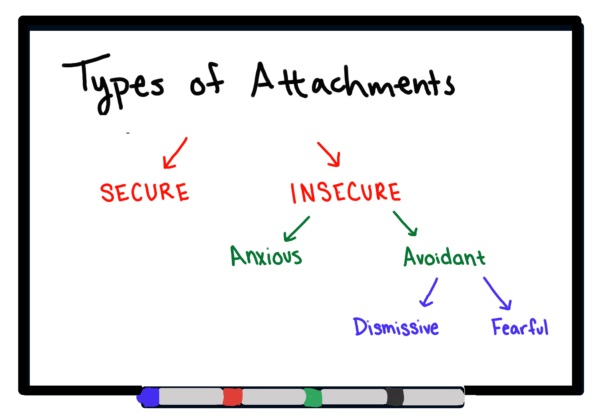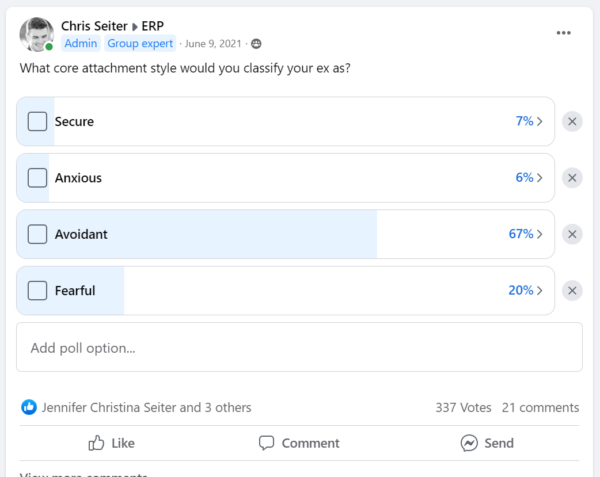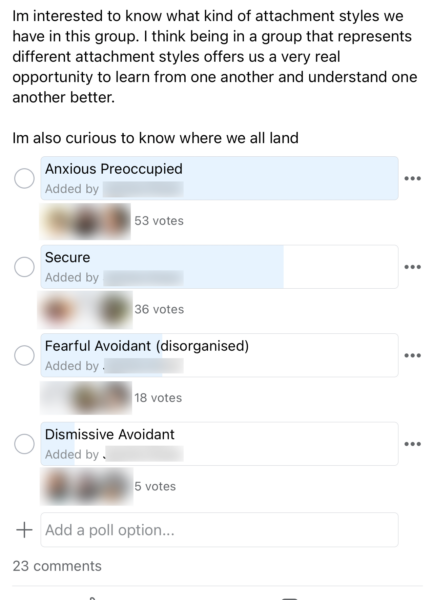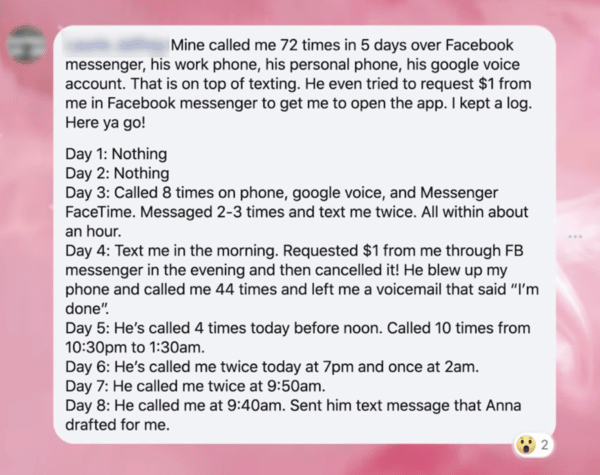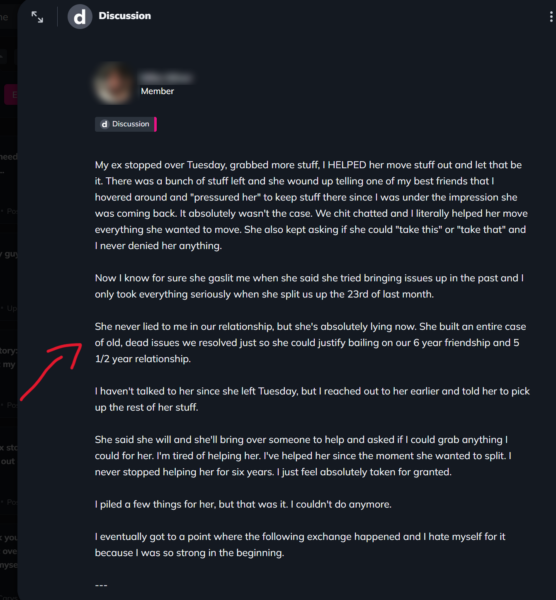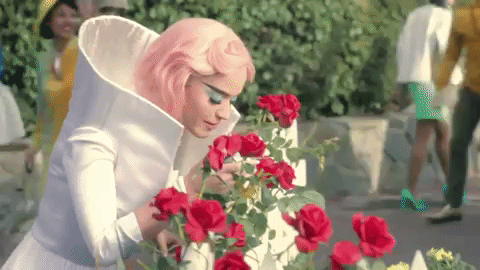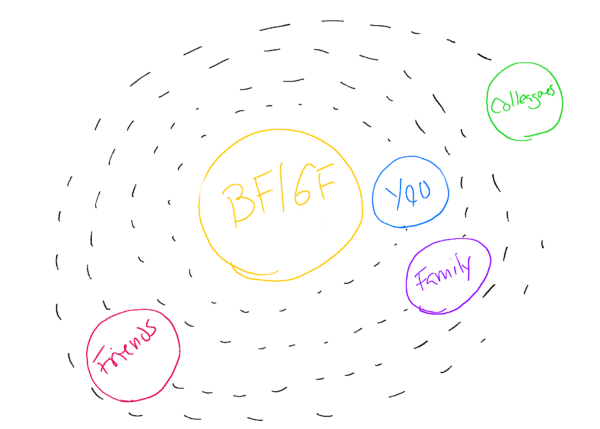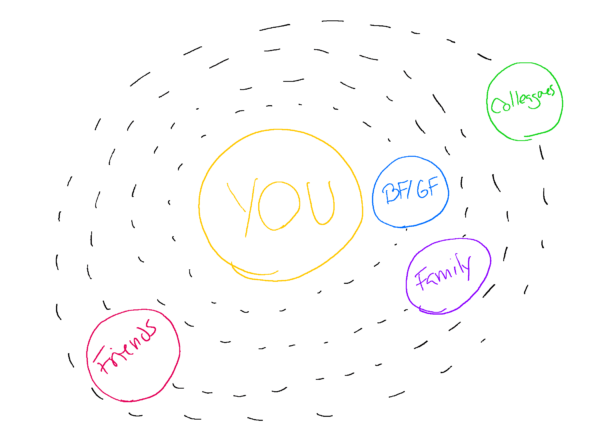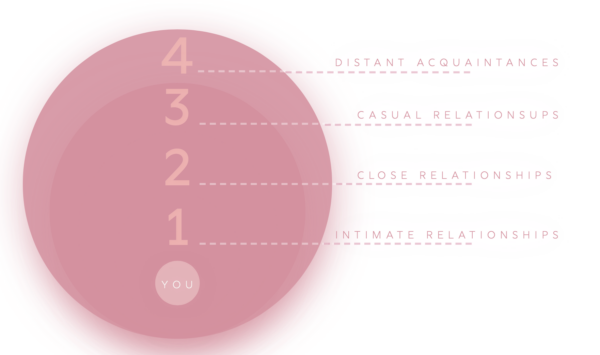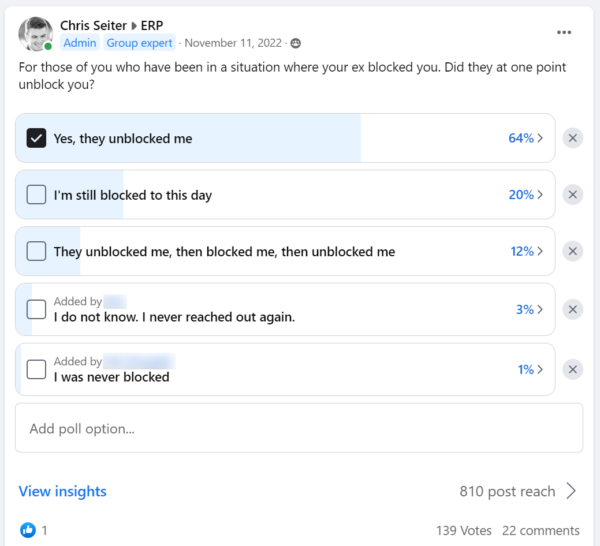There’s no doubt that going through a breakup is hard. Yet, sometimes what you see in the post breakup period is exes who obsess. Now, I’ve witnessed both exes and clients obsess over breakups so I feel like I have a pretty good handle on what the major signs of post breakup obsession are.
- They’ll likely have an anxious attachment style
- There will be obsessive contact
- They can sometimes spread rumors
- They can send you unwanted gifts
- They’ll attempt to interfere in new relationships
- They won’t respect your boundaries
- They’ll gather information from your sphere of influence
- They have persistent fantasies
- They’ll refuse to return your items
- They’ll create fake profiles
Today I’d actually like to take you through each one of these major signs and not only show you examples of it happening but even give a bit of commentary on each one.

What Are Your Chances of Getting Your Ex Boyfriend Back?
Take the quizSign #1: They’ll Likely Have An Anxious Attachment Style
I’ve been a fan of attachment theory for a really long time because I feel like it is maybe the best psychological theory out there that can help explain why exes react certain ways during a breakup.
There are essentially four main attachment styles:
- The secure attachment style
- The dismissive avoidant attachment style
- The anxious preoccupied attachment style
- The fearful avoidant attachment style.
The goal of all attachment theory is to try to take an insecure attachment and turn it into a secure one.
Out of the insecure attachments, there are three out of those four attachment styles:
- Fearful avoidance
- Dismissive avoidance
- Anxious preoccupied.
I’ve made it very clear that my work here at Ex Boyfriend Recovery has mostly centered around studying dismissive avoidance.
We found that our average clients ex has a dismissive avoidant attachment style,
Yet, we’ve also found that our clients have anxious attachment styles as well.
So while our client’s exes get the forefront of our attention, we can’t help but notice some of the anxious attachment style behaviors.
We think that if you’re looking at signs of an obsessive ex, that person is very likely to have an anxious preoccupied attachment style.
It really revolves around the anxious preoccupied attachment style’s core wound.
The core wound for anyone who has an anxious attachment style is always going to revolve around the fear of abandonment. They do not want to get abandoned. When that does happen, they react in all sorts of crazy ways to try to fix the problem.
This can include begging; this can include not holding boundaries, and in fact, many of the behaviors that we’ll talk about will be some of the signs that you’re going to be looking out for when you’re looking at obsessive exes.
The point I’m trying to make, though, is that if you know, based on your experience with your ex, that they have an anxious attachment style, this makes them a candidate for obsessing about you even that much more.
Sign #2: Excessive Contact:
All right, so after a breakup, you go through this period of time where maybe you want some space or your ex wants some space, and usually, someone who’s obsessing about their ex is unable to give them that.
They’ll bombard you with calls, texts, emails, and messages on social media. There’s really not a lot of substance behind this or reason.
Sometimes you do see situations where exes will call you and beg for you back.
We’ve actually seen sometimes that the no contact rule can exacerbate this. There’s a real famous example of a screenshot that I like to use of one of our clients whose ex contacted her 72 times when she used the no contact rule.

What Are Your Chances of Getting Your Ex Boyfriend Back?
Take the quizThe point is that if your ex is obsessed about you, you’ll find that they will start bombarding you with all sorts of forms of contact.
Sign #3: Spreading Rumors:
Not all exes will view the breakup kindly.
In some cases, they will attempt to tarnish your reputation to get back at you. They might spread false information or secrets that you trusted them with.
If you want a real example of this, in our community, we have an individual whose ex is doing this to them at this very moment.
Here’s a screenshot of that.
Basically, the relevant aspect that we want to look at here is where this client says,
“My ex stopped over Tuesday and grabbed more stuff. I helped her move stuff and let that be it. There was a bunch of stuff left and she wound up telling one of my best friends that I hovered around and pressured her to keep the stuff there and I was under the impression she was coming back.”
So already you can see that this client’s ex is spreading false information about him to mutual friends.
I think the psychology behind this is that it’s making the ex okay with the breakup because they don’t want to seem like the bad guy and they need the validation as if it’s them against me.
And so I think this kind of goes into why they’re spreading this rumor. But it’s also a sign of someone that is obsessed.
One of the famous sayings out there is,
“the opposite of love isn’t hate, it’s indifference.”
Usually, if your ex is really trying to get over you, you wouldn’t hear from them ever again. If you’re having an ex that constantly spreads attention or rumors, they are obsessed with you. But not all obsessions are healthy.
There’s this thought that if you’re obsessed with someone, you are in love with them. But that’s not always the case. Obsession can also occur in people who hate others. It’s a fine line, and I guess what I’m saying here is breakups seem to be a breeding ground for obsession.
Sign #4: Unwanted Gifts:
Alright, so let’s say that you go through a breakup and you make it clear that you just want to get over your ex.
You don’t want any contact; don’t talk to me at all.
And then, maybe a few days later, you get a gift in the mail or a gift shows up at your door.
I have a couple of stories about this from my own personal life.
One of my first clients that I ever took on got it in her mind after a breakup that if she just bought her ex a guitar (her ex was really into guitar playing), he would come back and it would set her apart from the rest of the other women out there that he was potentially interested in. So she goes out and buys this $500 guitar.
The ex is thrilled about it; he loves it. But he doesn’t come back.
He essentially takes her gift and says, “cool, thanks, see ya.”
I’ve seen friends and clients try the gift-giving thing. I’ve been on the receiving end of gifts too. I remember there was a girl I dated once who thought it would set her apart if she brought me flowers in the middle of a college class.

What Are Your Chances of Getting Your Ex Boyfriend Back?
Take the quizNow, I appreciated the sentiment, but it kind of creeped me out that she was willing to do that when we weren’t even really in a relationship.
She was desperate to get my commitment, and that wasn’t the way to go about it. In fact, it just lowered her value in my eyes because it seemed as if she was trying harder to get me than I was trying to get her.
She had placed me on a pedestal, and I was thinking, as cruel as this sounds, “well, I can do better than her. I want someone who I place on a pedestal.” And that kind of goes into the pedestal theory.
But here’s the point: unwanted gifts are a sign of obsession.
Sign #5: Attempting to Interfere in New Relationships:
Let’s say you’ve gone through the breakup and, after a couple of months, you meet this fantastic new person.
You’re in the midst of the honeymoon period with this individual, and everything is going splendidly.
Then, out of the blue, your ex decides to contact this new partner to warn them away from you or try to create issues between the two of you.
This isn’t the typical “being there” method we recommend, where we advise merely friend-zoning yourself and maintaining a presence with your ex.
Instead, this person is actively trying to split the two of you up.
They might bring up past secrets or mistakes, things you’d rather your new partner not know—details your ex is aware of.
This behavior only serves to further alienate you from them. You begin to see this person as a loose cannon, someone you cannot trust. However, this kind of interference is a massive sign of obsession.
Their actions might stem from jealousy, seeing someone else enjoy your company, leading them to ruin the experience for you. Some might even believe that by causing a rift in your new relationship, they’ll draw you back to them.
While this is seldom the outcome, it remains a clear indicator of obsession.
Sign #6: Inability to Respect Boundaries:
Let’s assume you’ve set clear boundaries, expressing that you don’t wish to communicate with your ex, yet they consistently disregard them.
This often relates to the codependent, anxious nature of many individuals.
I’ll be candid here: I’ve noticed that many clients who pay for my guidance regarding their breakups don’t typically face this issue from their exes. Instead, my clients often are the issue.
They display codependent tendencies, exhibit anxiety, and frequently fail to respect boundaries. Given that they’ve sought my expertise (and this isn’t a criticism, just an observation), many are deeply preoccupied with their exes.
A significant part of my guidance involves helping clients shift from a mindset where their entire life orbits their ex, like a planet revolving around a sun. I’ve even illustrated a graphic to explain codependent relationships, emphasizing the idea that one’s life should not be dominated by an ex.
The goal is to encourage individuals to create their own life ‘solar system’, one where the ex can still exist, but in a more balanced and healthier context.
The challenge lies in that codependent individuals, driven by their anxiety, struggle to maintain boundaries. This anxious behavior frequently manifests as obsession.
Sign #7: Gathering Information From SOI:
If you’re unfamiliar, the “sphere of influence” refers to the group of people you surround yourself with whose opinions significantly shape your own.

What Are Your Chances of Getting Your Ex Boyfriend Back?
Take the quizTypically, this includes friends, family members, and close confidantes.
The core of your sphere of influence usually consists of these individuals. Often, if someone within this circle shares an opinion, it can sway your own perspective.
However, someone obsessed with you might approach members of your sphere of influence to seek information. They may inquire with mutual friends or acquaintances about your activities, relationships, or whether you’re dating someone.
From our observations, the latter seems to be the most frequent query.
We often hear about exes reaching out to mutual contacts, asking about your dating status or well-being. If your ex is engaging in this behavior, it typically suggests they think about you frequently.
Curiously, even if you initiated the breakup, the aftermath can foster an environment conducive to obsession. Your cortisol levels, which correspond to stress, can spike, leading to increased anxiety.
And, as we know, heightened anxiety can precipitate obsessive thoughts. So, it’s not surprising that your ex might ponder about you quite a bit. But if they’re crossing the line by reaching out to your sphere of influence for intel, it’s a glaring sign of their preoccupation.
Sign #8: Persistent Fantasies:
Drawing from my own client base, as mentioned before, many of my clients exhibit anxious attachment styles.
I often find myself working with individuals who are striving to overcome their obsessions with their exes. One of the recurrent fantasies that I’ve observed in my clients is their unwavering belief that they will reunite with their ex or that they are destined to be with them.
This often persists even if the ex has unambiguously stated that the relationship has ended. A significant part of my work involves convincing these clients that they don’t necessarily need their exes to be content.
Fortunately, making this argument isn’t too challenging for me.
I have numerous success stories of clients who have embraced the idea of outgrowing their ex.
This philosophy revolves around the paradoxical strategy of trying to win back an ex by genuinely moving on from them—a concept deeply rooted in psychology. While I can present all these narratives and reasonings, truly internalizing them is distinct from merely acknowledging them.
So, the crux of the matter is that those obsessed with their ex tend to cling to the persistent fantasy that they and their ex are preordained to be together.
Even when I try to reason with them—highlighting that perhaps they’re destined to be with their ex but just not at this moment—it’s a challenge.
I often propose that the most effective strategy might be to genuinely start moving on, aiming to reconnect when they have a more lucid and rational mindset.
Sign #9: Refusal to Return Personal Items:
If your ex clings to personal items or gifts and resists returning them, it may be their way of maintaining a connection with you. We’ve observed this behavior frequently, especially from avoidant exes.
It seems a part of them desires to hold on.
For instance, a client might express their wish to retrieve their laptop, emphasizing that it’s not urgent, but they’d like it back eventually. The ex might agree, setting a future date for its return.
But often, they cancel just before the scheduled handover and keep rescheduling. This creates a continuous cycle. What they’re really aiming for is to keep an ace up their sleeve—a reason to initiate contact with you or to keep you “on the hook.”
Sign #10: Creating Fake Profiles:
This might sound unusual, but it’s not uncommon in our age of social media. Exes occasionally fabricate social media personas to monitor you or interact under a disguise.
This often happens with exes who’ve blocked you on their original accounts.
While statistics suggest that most exes eventually unblock given time and no interference,
During the blocked period, you might receive a friend request from a mysterious profile. This unfamiliar profile may have few friends, or perhaps features professionally taken photos, suggesting it might be someone you’d want to connect with.
Typically, this is an ex crafting a fictitious identity to observe you.
They don’t want to gratify you with the knowledge that they’re contemplating you. Establishing this counterfeit account provides them a covert method to keep tabs, indicating their obsessive tendencies.
